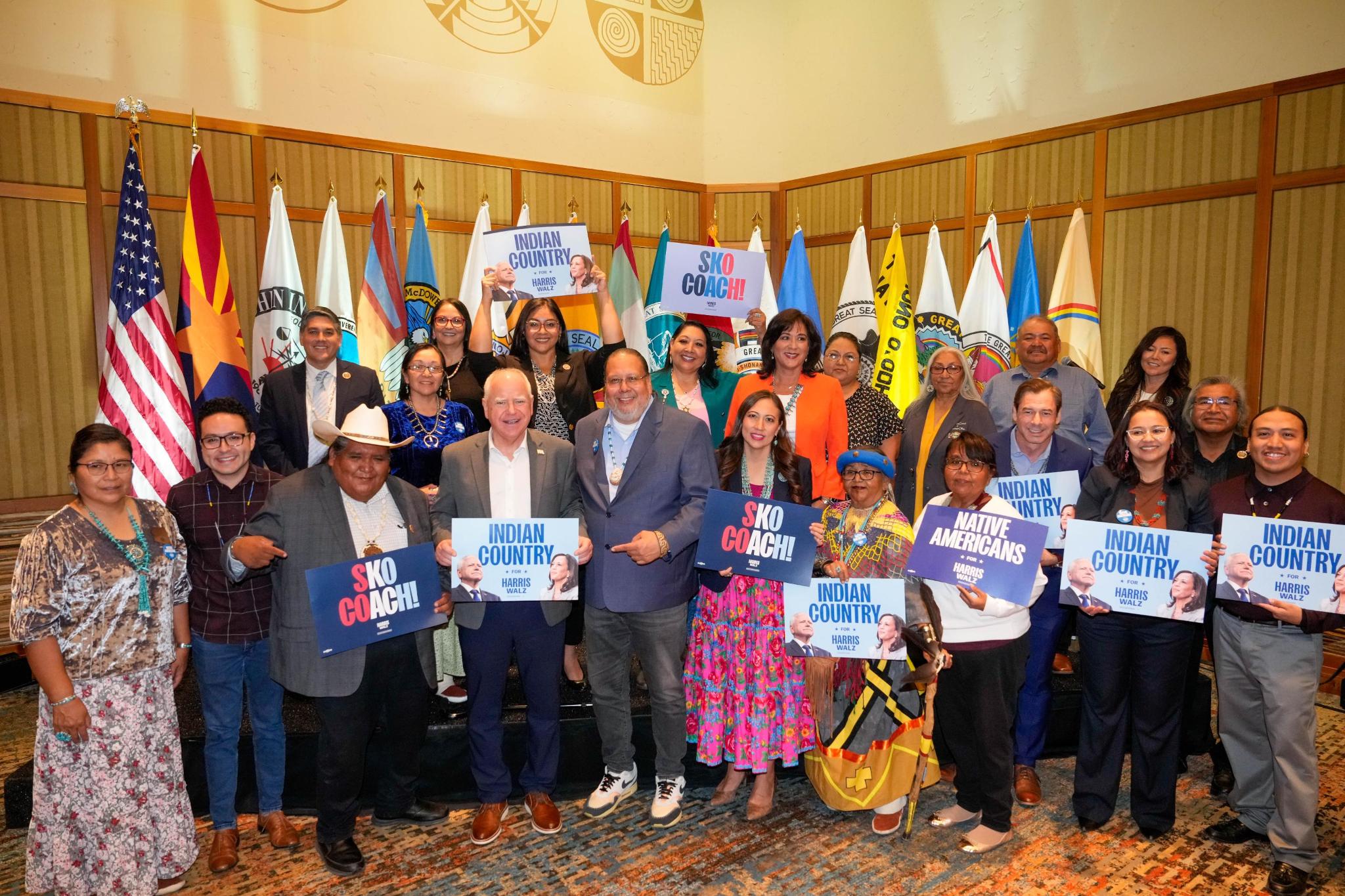
- Details
- By Neely Bardwell
Native Vote 2024. Minnseota Gov. Tim Walz, the 2024 Democratic Vice Presidential nominee, brought a message that tribal nations would alwasy have a voice in DC when Harris-Walz ticket is elected to Native American tribal leaders Gila River Indian Community.on Wednesday, October 9, 2024.
“We are not going back to the way it was,” Walz said, a common theme used in the Democratic campaign. “I feel it across the Indian Country that people know this is an opportunity to keep this momentum going forward,” he said. “This is an opportunity that many of us have waited lifetimes for, to finally see that we're seeing sovereignty as absolute truth.”
Walz was joined by tribal leaders, Gila River Indian Community Gov. Stephen Roe Lewis, Tohono O'odham Nation Chairman Verlon Jose, and Navajo Nation Vice President Richelle Montoya.
Walz has proven himself to Minnesota tribal leaders. He chose Minnesota Lt. Gov. Peggy Flanangan to serve as the second in commend their state.
As early in-person voting began on the same day as the meeting in Arizona, Walz touched on the importance of the so-called “Native Wall” of voters who could help swing the tight race in a state where President Joe Biden beat Trump by a margin of just about 10,500 votes in the 2020 election.
Walz spoke to the work that has been done across Indian Country by the Biden-Harris administration including funding projects like the Casa Blanca solar panel project by the Gila River Indian Community, which aims to battle water loss and boost tribal sovereignty by producing its own power.
“If the children of our tribal nations are doing well, everyone's doing well,” Walz said.
Roland Maldonado, chairman of the Kaibab Paiute Tribe, a small nation in northern Arizona, spoke with Walz about rural communities and the indifference historically shown to them.
“It was encouraging, continuing to build on the government-to-government relations, and really understanding the needs of rural communities. and understanding and accepting things that are, you know, historically missing,” Maldonado said. “And he understands the negative impact of that missing component of our history as a country and as individual Native communities.”
Nal-NiSHii Federation of Labor President Ervin Jackson released a statement following the meeting pointing out the “neglect” experienced under Donald Trump.
“Throughout their careers and on the campaign trail, Vice President Harris and Governor Walz have demonstrated a deep respect for Indigenous peoples, championing our rights, our sovereignty, and our cultural heritage.Trump’s presidency brought land loss, worsened health disparities, and challenges to our sovereignty. Another term under Trump would be devastating.”
More Stories Like This
Native News Weekly (August 25, 2024): D.C. BriefsScope Narrowed, Report Withheld: Questions Mount Over Michigan Boarding School Study
Zuni Youth Enrichment Project Announces Family Engagement Night and Spring Break Youth Programming
Next on Native Bidaské: Leonard Peltier Reflects on His First Year After Prison
Deb Haaland Rolls Out Affordability Agenda in Albuquerque
Help us defend tribal sovereignty.
At Native News Online, our mission is rooted in telling the stories that strengthen sovereignty and uplift Indigenous voices — not just at year’s end, but every single day.
Because of your generosity last year, we were able to keep our reporters on the ground in tribal communities, at national gatherings and in the halls of Congress — covering the issues that matter most to Indian Country: sovereignty, culture, education, health and economic opportunity.
That support sustained us through a tough year in 2025. Now, as we look to the year ahead, we need your help right now to ensure warrior journalism remains strong — reporting that defends tribal sovereignty, amplifies Native truth, and holds power accountable.
 The stakes couldn't be higher. Your support keeps Native voices heard, Native stories told and Native sovereignty defended.
The stakes couldn't be higher. Your support keeps Native voices heard, Native stories told and Native sovereignty defended.
Stand with Warrior Journalism today.
Levi Rickert (Potawatomi), Editor & Publisher


